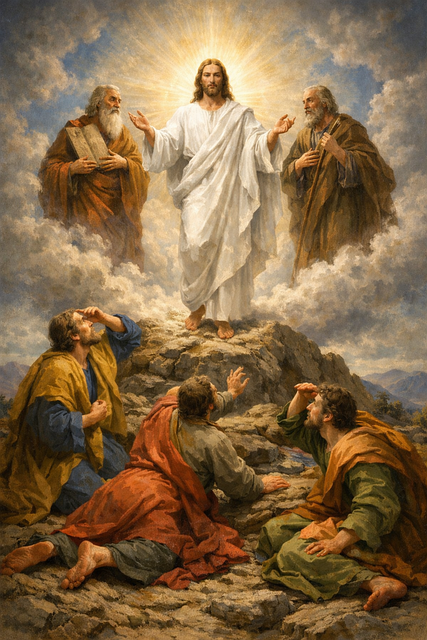
March 1, 2026

Discover the deeper meaning and connections found in this weeks' readings, through these great commentaries written by our priests.

Explore this weeks' readings and hear what God is saying to us through His Word.

Find out more about how we can mark this special day in our liturgy.

See our music recommendations for the liturgy.
Genesis 12:1-4a
Abraham, our father in faith, responds to the call to abandon land, family and nation to be blessed with a new land and the building of a great nation. With God's call and Abraham's response, the Book of Genesis changes focus from the effects of the Fall, the curses laid on the sinful Adam and Eve, to a fertile land in place of a hostile earth, to abundant offspring in place of pain in childbearing, and to prosperity in place of endless toil, blessings that will extend to all the nations of the earth.
2 Timothy 1:8b-10
Paul writes to encourage Timothy and all of us in times of difficulty and suffering with the grace God gives us. That grace, that love is manifested through the appearing of our Saviour Christ Jesus, who abolished death and brought life and immortality to light through the Gospel.
Matthew 17:1-9
How familiar is the scene of the Transfiguration. Just as Peter, James and John accompany Jesus to the high mountain, so they will be with Jesus in the Garden of Gethsemane. Their experience of the stunning transfiguration of Jesus with his face shining like the sun and his clothes as white as light will contrast starkly and agonisingly with the dark terror of the Crucifixion. Yet, as Jesus touched them and told them to have no fear on that mountain, so one day after the Crucifixion he would greet them with words of peace as he showed them his hands and his feet.
Reflection
There is great movement through sorrow to joy in today's readings stimulated by the grace of God. How difficult it must have been for Abraham to leave everything that was familiar to him and to trust in the promise of God but, ultimately, what joy came from his faithfulness to God.
Like Timothy, we have to embrace sufferings and difficulties as disciples of Jesus, following the one who loves the world but leads us beyond the world to the eternal life and light of the Kingdom of God.
As Jesus was transfigured, so we are invited to seek forgiveness of our sins and live in the light of God's grace.
May what we celebrate this Sunday encourage us in the movement of this Lenten season from darkness to light, from sin to grace, from death to life in Jesus.
A CAFOD Family Fast Day collection may take place today.
Today would have been St David’s Day, so don’t forget the people of Wales.
The Gospel for the 2nd Sunday of Lent is always the Transfiguration, this year from Matthew.
This is amplified in almost every text in today’s Mass: the First Entrance Antiphon (“hide not your face from me”), the Collect (“O God, who have commanded us to listen to your beloved Son,… with spiritual sight made pure, we may rejoice to behold your glory.”, the Gospel Acclamation (“From a bright cloud………………..”), the Preface for today (“…on the holy mountain he manifested to them his glory……………..that the Passion leads to the glory of the Resurrection”), the Communion Antiphon (“This is my beloved Son……………..”), the Prayer after Communion (“… while still on earth to be partakers even now of the things of heaven”), and the Prayer over the People (“… that glory whose beauty he showed in his own body, to the amazement of his Apostles.”). The unity of these texts is quite remarkable, reflecting the importance of the Transfiguration to Christianity.
Please see CCC paras 554-556 for a brief theological treatment of the Transfiguration.
These hymns have been selected from different sources:
Leave your country and your people (CFE351, L867, LHON417)
Be still, for the presence of the Lord (CFE72, L720, LHON165)
Immortal, invisible (CFE301, L725, LHON361, TCH225)
Be thou my vision (CFE74, L970, LHON168)
Key
CFE - Celebration Hymnal for Everyone
L – Laudate
LHON – Liturgical Hymns Old and New (Mayhew, 1999)
TCH – The Catholic Hymnbook (Gracewing)

Do you have questions about the liturgy and how we are called to participate in it? Explore how the Church councils, saints and popes have answered this key question and many more.

Every movement of the Mass is rich in meaning but we can become over familiar with it. Rediscover the Mass and explore how it relates to the Exodus story, where many of its rituals come from and how it makes Jesus present to us today.